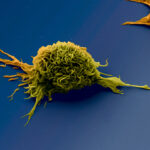Lien vers Pubmed [PMID] – 9794380
J Immunol 1998 Nov; 161(9): 4542-8
We analyzed the role of Ab affinity on Ab-mediated Ag uptake and presentation to T cells. Hen egg white lysozyme (HEL) was captured by bifunctional hybrid proteins (Fv-MalE) in which the variable fragment (Fv) of the anti-HEL mAb D1.3 was covalently linked to the Escherichia coli MalE protein. These complexes were targeted via two anti-MalE mAbs to an APC expressing a receptor for the Ab constant region. The combination of Fv-MalE and anti-MalE mAbs increased, specifically, HEL presentation. With this experimental system, we evaluated the impact of six different mutations, affecting the Fv-MalE complementarity determining regions, on the increase of HEL presentation by the corresponding hybrids. These mutations increase the dissociation rate constant (k(off)), and, thus, the dissociation constant of the HEL/Fv-MalE interaction, up to 650-fold, as compared with the wt Fv-MalE. Increasing the k(off) from 7 x 10(-4) s(-1) up to 300 x 10(-4) s(-1) did not interfere with the enhancement of HEL presentation. A mutant with a k(off) of 600 x 10(-4) s(-1) had a reduced enhancement ability, and mutants with k(off) higher than 5700 x 10(-4) s(-1) did not enhance HEL presentation at all. These results show that affinity determines the efficiency of Ab-mediated Ag presentation to T cells. One consequence is that affinity maturation in specific B lymphocytes can drastically enhance their ability to collaborate with T cells in an MHC-restricted way. This may contribute to the selection of high affinity B cell clones.



